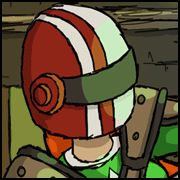|
Tuxedo Catfish posted:you can have my Elemental Plane of Snow That Is Exactly The Right Consistency For Snowballs, You Know The Kind when you pry it from my cold, dead fingers The Quasielemental Planes will never die!... except where they literally touch upon the realm of death, anyway.
|
|
|
|

|
| # ? Jun 1, 2024 23:59 |
|
Caedar posted:I think I can provide another data point. Yeah, I was hoping that we could use our next small Chuubo book (a collection of all 24 Arcs, including the ones from the corebook jazzed up and all the ones Jenna wrote for Patreon) to develop a relationship with a technical editor on a small project before committing to pay money for a big one. But at the size the book wound up being, we're looking at something like $4,500 just for the second tier of editing services that doesn't include mechanical stuff. That's nearly equivalent to a small book's art budget. How many books would make more additional money from having technical editing than they would from doubling the amount of art? (Nobilis might be one of them but I bet it's not true in a lot of other cases.) It's definitely something that people need but it's the kind of need that gets put off for unsurprising reasons.
|
|
|
|
Exalted 3e would sell much better if it had a technical writer review it
|
|
|
|
Rand Brittain posted:Yeah, I was hoping that we could use our next small Chuubo book (a collection of all 24 Arcs, including the ones from the corebook jazzed up and all the ones Jenna wrote for Patreon) to develop a relationship with a technical editor on a small project before committing to pay money for a big one. But at the size the book wound up being, we're looking at something like $4,500 just for the second tier of editing services that doesn't include mechanical stuff. Oooooh, when's that coming out? I'd love to have the patron Arcs in print.
|
|
|
|
Sampatrick posted:Exalted 3e would sell much better if it had a technical writer review it Most RPG fans don't care as long as they get to march up tall charm trees and wave their mote-dicks around.
|
|
|
|
Alien Rope Burn posted:
The prospect of wading through all the crap in the book in order to figure out what everything does has more or less convinced me to not purchase the book
|
|
|
|
dwarf74 posted:Mechanics-free source books just scream "90's excess" to me. In a novel, there should be one or more protagonists, one or more antagonists, and a central conflict. There should be a story in which the characters engage with the conflict, experience one or more rising actions, crises, resolutions, and an end to the story. The setting in a novel serves the story, and not the other way around. In a setting-oriented campaign sourcebook, there should be a bunch of people, none of whom are protagonists. Any of the people could be supporting characters or antagonists or irrelevant. There should be information about every significant place in the setting, irrespective of whether some part of a specific story's action took place there. The places exist to be options for the players and GM to include or not include in their story. Novels typically explore one or more themes. Unrequited love, the futility of revenge, a clash of culture, the trials and joys of becoming an adult, a struggle between good and evil. A campaign setting should present a menu of themes, each of which may be used or ignored. A war-torn borderland, a struggle between opposing noble houses, a schism in the church, social upheaval caused by a recent influx of war refugees, a council of wizards refusing to accept the government's attempts to reign in their worst excesses. Any given campaign, any given adventure, might pick one theme to play with, but a novel that tried to incorporate all of them would be a mess. Most importantly, a campaign sourcebook is about potential. It's up to the GM and characters to write the stories and - especially - the endings of those stories. And the players should be the ones creating and controlling the protagonists. If you organize a campaign sourcebook to be used as such, it should present the different types of information in a logical, consistent way that makes it easy to reference and access. A story might move through several different locations, introducing characters at various times, with events not necessarily in chronological order, and with various subplots being created and then resolved. Description of places will be scattered throughout the story, often only including whatever small portion of the area the characters themselves experience. A GM would not want to have to skim through several different short stories just to try to piece together what the City of Machines is actually like, or find the spot where the Mayor of that city is given a physical description. Players would not want to have to read the entire book just to find the handful of times anyone talks about the Green Glade Guard, so that he can make a Green Glade Guardsman as his PC. A well-written crunch-free sourcebook would not just be a collection of short stories. Now, is there an actual market? I have no idea, maybe not. Others have said that it's clear crunch sells game supplements, and that sounds believable to me, especially when we're talking about crunch-heavy, ever-bloating games like D&D. I dunno if crunch is what sells a campaign setting intended for Fate, or PbtA, or whatever. Maybe so. But I'm not really discussing what would be sellable, so much as pointing out that crunch isn't integral to what makes a campaign setting a campaign setting. And a campaign setting without crunch could be tackled and written very well by a creative writer with little or no attention given to the technical writing aspects, beyond some kind of sensible decisions around organization. Maybe campaign settings written by creative writers would be better if they didn't have lovely, unbalanced, poorly playtested rules written into them by creative writers who just haven't got the tools to hand to make good, balanced, clearly-written, mechanically consistent rules.
|
|
|
|
Sampatrick posted:The prospect of wading through all the crap in the book in order to figure out what everything does has more or less convinced me to not purchase the book You're wiser than I. 
|
|
|
|
Kwyndig posted:Oooooh, when's that coming out? I'd love to have the patron Arcs in print. Jenna's going over all the Arcs to try to equalize them so that there aren't any Arc levels where you just get a tiny upgrade and that's that, and to minimize the number of Arcs with insanely good loadouts at level 0. Then we kind of have to... decide what to do next? We're supposed to finalize GMD in May, which would be nice because finalizing that Kickstarter would make it possible to do another small one, and we could actually make decisions like whether a "really expensive editing" tier is a good idea, an interesting one, or a really bad one, and how much art we want to budget. As of right now, it's called The Book of Golden Hours.
|
|
|
|
Sampatrick posted:Exalted 3e would sell much better if it had a technical writer review it I'm willing to bet real world money that it wouldn't, and in fact spending the equivalent amount of money you'd have to on a technical editor to increase the art budget would almost certainly have better returns. That it puts you, personally, off is not a very relevant datapoint, I don't recall seeing any sort of massive hue and cry from backers up in arms over the naturalistic language demanding their money back, or anybody outside of the Something Awful Shitposting About Exalted thread who really cares that they deliberately opted to keep the old wonky BP/XP split for no reason whatsoever, or any of the other mechanical/conceptual issues you could point at to the degree that it looks like it's had a real negative impact upon Ex3's future.
|
|
|
|
Countblanc posted:What board games have you worked on? Or would that come dangerously close to doxx territory since your name is presumably in the manual? Nah, it's fine; I've already been doxxed. And since you asked, I might as well shamelessly self-promote: http://joshuayearsley.com/
|
|
|
|
Sampatrick posted:4e is a legitimately good game. There are things it could do better, but saying it's the barest beginning of playability is absurd. There are very few RPGs on the market that have math as tight as 4e, especially if you're looking at what the math looks like in the Monster Vault. Well, I was being a bit facetious. Much like D&D 4E, Exalted 3E is the most playable the game's ever been, and its math basically works and so on, but it's got all the equivalents of ability scores, feats, buff tracking, etc.
|
|
|
|
Caedar posted:Nah, it's fine; I've already been doxxed. And since you asked, I might as well shamelessly self-promote: http://joshuayearsley.com/ Lagoon has a great manual, so good on ya. How do you feel about rulebooks like the ones Chvátil makes where they're half-rules half-clarifications/summaries-as-jokes? I see equal amounts of people saying that it makes them much less of a slog to read plus the dialogue-style language can make it easier to parse some things, and people saying it's annoying and just makes it harder to find answers for rules questions.
|
|
|
|
Caedar posted:Nah, it's fine; I've already been doxxed. And since you asked, I might as well shamelessly self-promote: http://joshuayearsley.com/ Oh dang, you worked on Lagoon! I gotta say that was one of my earliest kickstarters and I was really happy with the result. The game is well presented and the rules are tight, too. Well done. When you're doing a substantive editing pass with a new client, do you find that you get a lot of pushback, or are your clients generally happy to get a list of major structural changes, be told they've made inconsistent style choices that need to be reconciled, or that their central theme is murky and poorly defined? Also do you actually "proofread" the mechanical soundness of the rules, or do you leave that to the playtesting?
|
|
|
|
Kai Tave posted:I'm willing to bet real world money that it wouldn't, and in fact spending the equivalent amount of money you'd have to on a technical editor to increase the art budget would almost certainly have better returns. That it puts you, personally, off is not a very relevant datapoint, I don't recall seeing any sort of massive hue and cry from backers up in arms over the naturalistic language demanding their money back, or anybody outside of the Something Awful Shitposting About Exalted thread who really cares that they deliberately opted to keep the old wonky BP/XP split for no reason whatsoever, or any of the other mechanical/conceptual issues you could point at to the degree that it looks like it's had a real negative impact upon Ex3's future. This is a bad way of judging if it mattered. The backers were extremely unlikely to interact critically with the text - they just wanted a new edition of Exalted. You'll notice that when you're talking about Exalted with anybody that isn't already invested in the game, you can talk about the amazing setting and all the cool stuff you can do it but you can't ever tell them how easy the game is to get into. Exalted has a reputation in the hobby that it's very hard to get into and very complicated. If 3e had been looked over by a technical writer, it might have been able to shed that reputation and attract new customers. As it is, most customers are just those who were already invested during 1e/2e.
|
|
|
|
Rand Brittain posted:Yeah, I was hoping that we could use our next small Chuubo book (a collection of all 24 Arcs, including the ones from the corebook jazzed up and all the ones Jenna wrote for Patreon) to develop a relationship with a technical editor on a small project before committing to pay money for a big one. But at the size the book wound up being, we're looking at something like $4,500 just for the second tier of editing services that doesn't include mechanical stuff. Yup, you're referring to me.  (I think you knew that?) Yeah, when a book breaks 100k words, it gets pricey (relative to typical RPG budgets) pretty quickly. (I think you knew that?) Yeah, when a book breaks 100k words, it gets pricey (relative to typical RPG budgets) pretty quickly.Edit: We might want to talk again though, because that tier definitely does include mechanical stuff, just fewer passes. Caedar fucked around with this message at 01:17 on Apr 19, 2017 |
|
|
|
Sampatrick posted:The backers were extremely unlikely to interact critically with the text You basically seem to be making my point for me. Roleplaying hobbyists that want to critically engage with the actual game portion are a minority and throwing money after that is likely to be a waste of time and not drastically broaden the appeal of it. A non-zero number of roleplayers consider sloppy writing and poor balance to be features instead of bugs. They don't care about solid tech writing and in fact the last time an RPG came out with more effort put into clarity of rules and solid technical underpinnings than most it got hit with four years of people endlessly bitching about it until it all got rolled back. If Exalted has a reputation in the hobby I'm also willing to bet that it has less to do with anything about its technical writing or mechanics and more to do with "oh yeah that's the anime game where you swing swords the size of surfboards around" or maybe "oh yeah that's the game with the weird child rape fetish poo poo in that one sourcebook."
|
|
|
|
The reason why mechanics-free splatbooks don't sell as well is because the mechanics are, by-and-large, how the players interact with the game, and players outnumber GMs. I mean, sure, it's cool that there's a country at the end of the lane that's run by benevolent squid-wizards, but that's not something that players can really do much with. And even GMs often like getting new mechanics in the form of statblocks, hazards, and maps that they can use. Newer games are getting a lot better at giving players other ways to interact with the setting, but traditionally, a player doesn't get much use out of setting books, since they're reliant on their GM bringing those aspects in. And a lot of the enjoyment from players in traditional RPGs is in learning those setting details through gameplay. Of course, newer RPGs give players more ways to interact with the setting. But in a lot of them, they interact with it by inventing it. You don't really need a setting book in, say, Fellowship because half the fun is in letting players create parts of the setting instead of just learning them. It's not an unsolvable problem, but it's a little more nuanced than "people want mechanics because of D&D brain damage."
|
|
|
|
Does Exalted 3e do anything to make it easier to balance the combat ability/survivability of a party, easily make relatively balanced opponents, avoid presenting horrible chargen traps, and not break down horribly past entry-level PC territory? Since holy gently caress I can't imagine how anyone actually played Ex1-2e, all my attempts to both run it and play in it ran into unsatisfying disasters only a few sessions in when it proved nearly impossible to get every character challenged, or enemies either rolling over the party or dropping like flies, or whatever. Maybe Ex3e is better, I honestly don't know, I've only ever given it the briefest skim. But it doesn't seem like it fundamentally changed anything that would fix the problem, ie, the entire loving system. And I say this as someone who really really wanted to like the series too. 
|
|
|
|
JackMann posted:It's not an unsolvable problem, but it's a little more nuanced than "people want mechanics because of D&D brain damage." "D&D brain damage" is shorthand for "traditionally, a player doesn't get much use out of setting books" et cetera. D&D was about new classes, new spells, new skills/proficiencies, new monster statblocks, new magic items, new feats; its immediate siblings did the same. Their successors all did the same. So now we have much (most?) of the RPG market and people in this very thread saying that is the natural order of things, that of course new crunch is THE WAY players interact with the world, whatever else could there be for players to interact with, and furthermore why would you think that it is even possible that a book could succeed without that? As Leperflesh explained in greater detail, it needn't be that way. 4e's Eberron Campaign Guide is a great book and it would be great if it were just the setting stuff and the adventure at the back. And I do indeed understand that crunch sells books; for the crunchy systems I have played, that was a big part of what I wanted more of. They sell because our RPG heritage is mostly crunchy games, though, not because "crunch is how a world comes alive."
|
|
|
|
Sampatrick posted:If 3e had been looked over by a technical writer, it might have been able to shed that reputation and attract new customers. As it is, most customers are just those who were already invested during 1e/2e. Well, it was basically designed by hardcore fan contributors who saw a lot of the flaws as features or at least as sacred cows, and wanted to just make an idealized, functional version of 1e. Inmates, asylum, etc. Asimo posted:Does Exalted 3e do anything to make it easier to balance the combat ability/survivability of a party, easily make relatively balanced opponents, avoid presenting horrible chargen traps, and not break down horribly past entry-level PC territory? Yes, no, meh, ahahahahaha gently caress. It's harder to gently caress up doing what you want to do but given combat and noncombat stuff still draws from the same pool of resources there's no serious attempt make combat more of a consistent or balanced endeavor.
|
|
|
|
Asimo posted:Does Exalted 3e do anything to make it easier to balance the combat ability/survivability of a party, easily make relatively balanced opponents, avoid presenting horrible chargen traps, and not break down horribly past entry-level PC territory? Since holy gently caress I can't imagine how anyone actually played Ex1-2e, all my attempts to both run it and play in it ran into unsatisfying disasters only a few sessions in when it proved nearly impossible to get every character challenged, or enemies either rolling over the party or dropping like flies, or whatever. Its better in most of those areas, but I wouldn't say they're "fixed". Accidentally insta-killing is much less likely, and none of the charm trees are a complete waste (though some are highly dependent on GM interpetation). On the other hand, while it uses simplified NPCs, most of the advice is still more or less "eyeball it", and there are definitely ways to build characters more or less efficiently depending on how well you grasp the system.
|
|
|
|
Siivola posted:Applies to the people working on Magic, as well. Trying to parse a particularly old card is a real trip sometimes. Time Walk might be the most broken card in the history of Magic, but the text of the original playtest version was the worst ever in that regard: it simply read "Opponent loses next turn." There's an anecdote from Richard Garfield in the first-ever MTG player's guide where a player brought that card up to him bragging about how he was always guaranteed to win on the next turn if he played it, and it took RG a minute for him to realize that the player was talking about the text on the card itself rather than some unbeatable two-turn combo.
|
|
|
|
homullus posted:"D&D brain damage" is shorthand for "traditionally, a player doesn't get much use out of setting books" et cetera. D&D was about new classes, new spells, new skills/proficiencies, new monster statblocks, new magic items, new feats; its immediate siblings did the same. Their successors all did the same. So now we have much (most?) of the RPG market and people in this very thread saying that is the natural order of things, that of course new crunch is THE WAY players interact with the world, whatever else could there be for players to interact with, and furthermore why would you think that it is even possible that a book could succeed without that? But once you have a game that does make that distinction, that's a drat strong argument for having mechanics in your sourcebooks.
|
|
|
|
I actually decided to go check out Green Ronin and see how Freeport was faring since that was the last even semi big-name RPG publisher I knew of that decided to publish a systemless sourcebook detailing a campaign world in any depth. Freeport didn't actually start out as such, I believe it was originally conceived as a setting for a series of 3.X adventures which they then decided to broaden out into a full-fledged system agnostic campaign setting. We're not talking a tiny little half-assed effort either, it was a 256-page hardback book along with two 144-page supplementary sourcebooks, so that's quite a significant amount of work and effort put into what is basically a trio of RPG sourcebooks with literally zero crunch. Apparently they've decided it's more worth their time to go the Pathfinder route as of late so I'm just going to go out on a limb and guess that the whole "systemless sourcebook" thing didn't exactly set the world on fire.
|
|
|
|
Caedar posted:Yup, you're referring to me. Oh, yeah, I definitely knew I was simplifying; I just wanted to make the weight of the choice clear. I should give you a formal update on that status.
|
|
|
|
Kai Tave posted:I actually decided to go check out Green Ronin and see how Freeport was faring since that was the last even semi big-name RPG publisher I knew of that decided to publish a systemless sourcebook detailing a campaign world in any depth. Freeport didn't actually start out as such, I believe it was originally conceived as a setting for a series of 3.X adventures which they then decided to broaden out into a full-fledged system agnostic campaign setting. We're not talking a tiny little half-assed effort either, it was a 256-page hardback book along with two 144-page supplementary sourcebooks, so that's quite a significant amount of work and effort put into what is basically a trio of RPG sourcebooks with literally zero crunch. Apparently they've decided it's more worth their time to go the Pathfinder route as of late so I'm just going to go out on a limb and guess that the whole "systemless sourcebook" thing didn't exactly set the world on fire. Well, they did put out a lot of system-specific sub-books; they did d20, Pathfinder, Fate Accelerated, Savage Worlds, and they just kickstarted a version for Shadow of the Demon Lord.
|
|
|
|
Countblanc posted:Lagoon has a great manual, so good on ya. I found the first edition of Robinson Crusoe incredibly difficult to understand, but more so for reasons other than the one you cited. I don't really like badmouthing rulebooks in public because I know how hard it is to make a good one. That said, I do think that lots of game rulebooks fall on their faces in terms of "let's cram all of the clarifications and exceptions we can right underneath the rule that actually matters 99% of the time, but without making any distinction whatsoever that these concepts are less important than those concepts." Scythe is an exemplar of a rulebook that doesn't do this. I'm glad that Ignacy got Paul Grogan (who does lots of rules how-to videos and rulebook work at Gaming Rules!) to edit the second edition. I haven't read the new rulebook, but Paul's a good editor, judging by Days of Ire (which I just played, incidentally). Leperflesh posted:Oh dang, you worked on Lagoon! I gotta say that was one of my earliest kickstarters and I was really happy with the result. The game is well presented and the rules are tight, too. Well done. I don't get much pushback, except in one instance that will forever be seared into my brain when I was doing a free edit (lol) years ago. Most of the time now, clients come to me by word of mouth, so that likely means they trust me already. I probably get the most pushback on proposals for terminology changes. Sometimes, people are really attached to names they've picked for components or game-specific terms, and don't want to change them in favor of clarity. I'm not 100% sure what you mean by proofread the mechanical soundness, since "proofread" already carries a really specific meaning in my mind. Do you mean development work? If so, sometimes, but mostly for publishers that I have a really good rapport with already (Evil Hat, for example). Or do you mean something else? One thing I'm hoping to encourage is a reasonable period of post-edit blind testing on large, complicated projects with the near-final laid-out rulebook, because I've learned over time that there are some types of errors that are basically impossible to spot in a vacuum. Unfortunately, many publishers are on an extremely tight timeline (I'm talking days to a week) between the rulebook layout getting finished and the pub needing to send the book to printers, so tight that such testing is a really hard to propose, let alone both proofreading of the laid-out version (which is also very important) and usability testing. Rulebook quality goes way up when a pub isn't in a rush in the last 5% of the project, though I'm not a project management expert, so I'm not the person to ask about how to make that happen.
|
|
|
|
Evil Mastermind posted:Well, they did put out a lot of system-specific sub-books; they did d20, Pathfinder, Fate Accelerated, Savage Worlds, and they just kickstarted a version for Shadow of the Demon Lord. Yeah I noticed those too, plus it looks like they have stuff for the AGE system as well which is their own in-house system being used for stuff like Dragon Age and the new Blue Rose, my point was less that Freeport had crashed and burned so much as apparently it seems like it's more worth Green Ronin's time to make a bunch of individual Freeport books for various RPGs including crunch therein rather than making a one-size-fits-all systemless setting and hoping that people jump on that. You can still buy the systemless version but it doesn't look like it's getting further support, and I guess you could look at it as a matter of there not being a need to keep making it if you have over 500 cumulative pages of setting already, but in terms of practical "how do we get people to actually buy the poo poo we're publishing" terms it looks like what people actually want is stuff that comes with crunch in it.
|
|
|
|
Caedar posted:I'm not 100% sure what you mean by proofread the mechanical soundness, since "proofread" already carries a really specific meaning in my mind. Do you mean development work? If so, sometimes, but mostly for publishers that I have a really good rapport with already (Evil Hat, for example). Or do you mean something else? One thing I'm hoping to encourage is a reasonable period of post-edit blind testing on large, complicated projects with the near-final laid-out rulebook, because I've learned over time that there are some types of errors that are basically impossible to spot in a vacuum. Yeah proofread isn't the right word. I guess I mean, for a game, do you evaluate the mechanics of the game - the rules and how they work together? Sometimes just reading a game's rules something stands out as probably not well-conceived, or inconsistent with other game mechanics, or unnecessarily complicated. These are issues that would certainly arise during playtesting, but if you're doing a substantive edit of a set of rules, experience might lead you to noticing things like this without even playing the game. Just as an example: perhaps a game's winning condition is to accumulate the most victory points, but it's not convenient for players to count their own VPs (much less those of other players) mid-game, to see how they're doing. Or: a game is using a coin flip to break ties a lot, instead of avoiding frequent ties. Or: a game has a set of components (maybe a deck of cards or some tokens) that are rarely used and in some cases a game might pass where those components are never used, so perhaps they're a waste of game budget. Evaluating the game's mechanical systems might or might not be within the scope of your editing passes, I guess, so I'm curious whether you do that or not. For my own work: my job, theoretically, is to communicate to customers how to succeed with our products. Often an engineer will provide me with design documents, a demo of an application, access to a test instance, or just an email or wiki page describing how to accomplish a task. Typically the basic expectation is that I'll write that stuff up and make it coherent and well organized. But, sometimes I go back to the developer or designer and point out flaws or make suggestions about the design itself. We're using a five-step wizard to perform configuration, which is fine during first-time setup, but for long-term maintenance the administrator will get annoyed they have to use that wizard each time they want to make a change to a single value that is shown on screen #6 of 8 in the wizard. The OAuth token always expires after 60 minutes, shouldn't we give the developer the ability to set a different token timeout? OK yes I can explain how to find the fully-qualified domain name in the console, but since literally 100% of customers will need it immediately in order to set up user propagation, could we just tell them the endpoint in the confirmation email they get when they sign up for the service? Sometimes my co-workers are receptive and appreciative of those kinds of suggestions, and sometimes they're seen as stepping on the toes of some design team or (especially) product manager who already made a decision about it and doesn't want to revisit made decisions.
|
|
|
|
homullus posted:"D&D brain damage" is shorthand for "traditionally, a player doesn't get much use out of setting books" et cetera. D&D was about new classes, new spells, new skills/proficiencies, new monster statblocks, new magic items, new feats; its immediate siblings did the same. Their successors all did the same. So now we have much (most?) of the RPG market and people in this very thread saying that is the natural order of things, that of course new crunch is THE WAY players interact with the world, whatever else could there be for players to interact with, and furthermore why would you think that it is even possible that a book could succeed without that? It's not brain damage for players to expect some new mechanics in an RPG supplement when the vast majority of supplements for every RPG in existence offer some extra mechanical tools. Dismissing consumer expectations on D&D post-traumatic stress disorder is idiotic.
|
|
|
|
Leperflesh posted:Yeah proofread isn't the right word. I guess I mean, for a game, do you evaluate the mechanics of the game - the rules and how they work together? Sometimes just reading a game's rules something stands out as probably not well-conceived, or inconsistent with other game mechanics, or unnecessarily complicated. These are issues that would certainly arise during playtesting, but if you're doing a substantive edit of a set of rules, experience might lead you to noticing things like this without even playing the game. Oh yeah, I definitely do this. All of the stuff you described is very close to the "game usability" side of things, which is important to making a game that is easy to learn and play and thus kinda my mandate. A lot of these problems come from janky ordering of rules, specifically timing rules, and they're prevalent in setup steps and in the very foundations of round/turn order ("Why is this draw step at the start/end of the turn rather than the other? That creates like four other unnecessary rules."). I get even more opportunities to do this sort of thing when I get the chance to work with the graphic designer (which I don't always). In the ideal edit, I get to assess all of the ways the players get to and interface with the actually creatively interesting parts of the game: all the boring administrative, fiddly stuff that makes the game actually function.
|
|
|
|
This thread has given me a much better appreciation for just how much I want an editor, and how sternly I will never be able to afford one.
|
|
|
|
Honestly, assuming a system with any real amount of crunch, it's not hard to add player-side mechanics to your books. Just make them a) fit the book, and b) all worth utilizing. The problem is when you use those mechanics not to reinforce the flavor of the book but instead purely as filler - which is what D&D has more or less ALWAYS suffered from.
|
|
|
|
In a long line of 3.X's legacies feats might very well be one of the worst because it set a really pervasive precedent for how to pad an RPG full of garbage crunch even more than people were already inclined to do so. "But you could just make feats better! More impactful! More important!" Sure, but at that point they wouldn't really be feats anymore.
|
|
|
|
ProfessorCirno posted:Honestly, assuming a system with any real amount of crunch, it's not hard to add player-side mechanics to your books. Just make them a) fit the book, and b) all worth utilizing. So all of those niche prestige classes and class substitution levels in, say, the Forgotten Realms Campaign guide, is that an example of "filler" or of "reinforcing the flavor of the book"? Honest question, because I see like a Purple Dragon Knight and it would totally fit into the "flavor" of the campaign to let the Fighter character turn into or advance through that if he at some point pledged fealty to the Obarskyrs, but at the same time I don't know if people ever actually used it like that.
|
|
|
|
gradenko_2000 posted:So all of those niche prestige classes and class substitution levels in, say, the Forgotten Realms Campaign guide, is that an example of "filler" or of "reinforcing the flavor of the book"? The arc that Prestige Classes underwent is kind of funny because they were absolutely originally intended to be (or at least claimed to be) things that GMs would carefully tie into their campaigns to reinforce flavor and reward players for undergoing special quests and practically immediately they broke from that and started stuffing books full of the fuckin things with special prerequisites like "have 5 ranks in a skill" or "have a level in this class" and literally nobody on the entire planet earth tied them into any campaign, they just used them as Lego bricks to squeeze the most bullshit possible out of the chargen minigame. And everybody just kinda went along with it. This probably isn't a very helpful answer but "is this mechanical crunch filler or not" is imo entirely contingent on if it's actually any good. If a sourcebook comes out that devotes pagespace to the new Headsmash Fuckstomper prestige class with accompanying feat chain and it turns out that lo and behold it's all actually good then obviously it gets a pass, but if it's not good then it probably shouldn't have been thrown in there in the first place, and it's not always very difficult to tell if something was hastily slapped together to pad out some space (oh look, another Wizard prestige class that reduces their effective caster level, pass. Oh hey, another dozen extremely lovely feats, sure don't have enough of those). Basically you can kinda tell when the crunch feels obligatory because well you obviously have to "reinforce the flavor" as opposed to something that's actually useful.
|
|
|
|
Pretty much, the issue is that so far as I'm aware, there aren't many games where players interact with the setting outside of the crunch where a setting guide would be useful. The only games I know of where players have other tools to directly interface with the setting, they're actively creating the setting whole-cloth. Fellowship, for example, where if you play a dwarf, you decide what all dwarves are like. A setting book wouldn't really be useful there. In more crunchy systems, setting information can be nice, but it's still not the part of the game the player is directly in charge of, and they have to hope the GM is going to help them work it into the game. It's not an insurmountable issue, it's just that you'd need to make a game where the player had some way of creating those interactions with the setting, regardless of what the GM did, and where they needed the input from the writers rather than just making things up. Basically, the problem isn't with the people playing the games, it's with the games themselves.
|
|
|
|
Ferrinus posted:Well, I was being a bit facetious. Much like D&D 4E, Exalted 3E is the most playable the game's ever been, and its math basically works and so on, but it's got all the equivalents of ability scores, feats, buff tracking, etc.
|
|
|
|

|
| # ? Jun 1, 2024 23:59 |
|
Kai Tave posted:The arc that Prestige Classes underwent is kind of funny because they were absolutely originally intended to be (or at least claimed to be) things that GMs would carefully tie into their campaigns to reinforce flavor and reward players for undergoing special quests and practically immediately they broke from that and started stuffing books full of the fuckin things with special prerequisites like "have 5 ranks in a skill" or "have a level in this class" and literally nobody on the entire planet earth tied them into any campaign, they just used them as Lego bricks to squeeze the most bullshit possible out of the chargen minigame. And everybody just kinda went along with it. The impression I got, and something I hypothetically plan to do if I got the chance, is that these things would probably be more useful as something you gave to players upon reaching certain narrative goals and milestones, rather than something you expect them to deliberately aim for. Like, if a player actually does pledge fealty to the Obarskyrs, you'd do well to give them a level of, or the special abilities of, a Purple Dragon Knight, rather than "forcing" them to take a level in a class that they might otherwise not be interested in because they have a different build in mind. The same might apply to any number of feats: if the player does A Special Thing, they get a feat as a recognition of that accomplishment. Of course, the problem with that line of thought that I already expect is that you're never going to trigger "player without Improved Trip tries to trip a dude in an act of desperation", both because the unimproved trip rules are so bad as to be unfeasible to try without the feat, and because character specialization means that they're probably going to stay entirely within their special ability wheelhouse throughout play.
|
|
|




























